#academic libraries
Text
Dear college students,
I really hope that I, your spinster aunt of Tumblr, am not the first person to tell you this, but: please use your university library services. You are paying for them. They are there for you. Moreover, your professors are operating on the assumption that you will use them as necessary.
When I say "library services" I mean not only physical books that will help you with research, but the usually more extensive eBook collections ditto. Novels you've been meaning to get around to and can't afford to buy. Even (quaintly?) DVDs for your entertainment. And perhaps most significantly of all, interlibrary loan.
I'm going to reiterate interlibrary loan in its own paragraph because a student complained to me recently that publishers were "literally incentivizing piracy" by not pricing academic monographs for purchase by college students and my reaction is best summed up as: ????? Publishers typically price scholarly monographs in the pious hope of not losing money on them. Everyone complains about the ones priced at $300, and a lot of them are priced around $30-50. They are priced for purchase by libraries and specialists. And they are priced for purchase by libraries precisely so that libraries can make them accessible to college students. Anyway, use interlibrary loan, good grief.
TL;DR: the library is there for you, that is what it is for, please behave accordingly.
#spinster aunt of tumblr#libraries#academic libraries#studyblr#college#also i took my survey class to the library this week and none of them had heard of boolean operators#did they all miss fourth grade#and sixth grade#and then never get asked to write a research paper ever#i am baffled#this particular student didn't want to pay more than $10 for a book but that's a different issue
700 notes
·
View notes
Text

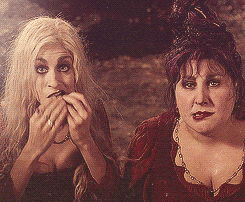


— beware the autumn people 🍂
#halloween#halloween vibes#halloween aesthetic#pumpkin#horror#horror halloween#halloweencore#autumn vibes#autumn moodboard#autumncore#autumn#wednesdays full of woe#dark academia#books#light academia#academic libraries#libraries#dark acadamia aesthetic#dark academia moodboard#spilled ink#chaotic academia#book aesthetic#dark aesthetic#poems on tumblr#gothic#hocus pocus#autumn leaves#cosy vibes#cosycore#cottagecore
2K notes
·
View notes
Text
rainy days, good books, coffee, tea, cold weather, autumn season, sweaters, the smell of pastries or baked goods, sunsets and sunrises, gorgeous buildings, and libraries with high ceilings.
#my ultimate favorites#books & libraries#dark academia#dark aesthetic#dead poets society#light acadamia aesthetic#light academia#literature#poetry#quotes#romantic academia#academic libraries#coffee and tea#windy nights#study blog#studyblr#chaotic academia#chaotic academic aesthetic#classical literature#dark academic aesthetic#classic lit quotes#dark academia aesthetic#donna tartt#the secret history#classical paintings#love quotes#cottage core#sylvia plath#can it be autumn already?#oscar wilde
4K notes
·
View notes
Text

“As librarians, we’re not here to judge, we’re here to help.”
#books & libraries#the librarians#public libraries#support libraries#school libraries#academic libraries#libraries#care#humanity#help each other#good news#toughtopics#library#librarians#books and reading#comic books#bookstagram#books#book quotes#bookblr#booklr#book#literature#reference#freedom of information#informative#information#info#info post#ausgov
170 notes
·
View notes
Text
This is a friendly reminder that libraries exist and that they have more than just books.
Now, some libraries have more services than others but even the most basic libraries will have shelves upon shelves of dvd, cd, books, games, etc… that you can borrow and use for free(!!!)
Some more bougie libraries will also have other awesome stuff.
For example, I once went to a library with a recording booth with a good quality mic, they had a green screen room, cameras that could be borrowed, computers with the Adobe suite to do editing, as well as a plethora of other resources and help from librarians.
Another thing, ask what your local librarians can do. They often are really good at researching and also might be able to borrow things from other libraries as well.
Also, once you get a library card you can sign up for Libby that has a ton of books and audio books (again) for free.
Personally I just borrowed the 4th series of doctor who and have been watching the episodes and extra content on the dvds. I’m having a blast!
#books & libraries#public libraries#library#library stuff#library services#support libraries#school libraries#academic libraries#libraries and archives#i love libraries#doctor who#doctor who confidential#donna noble#10th doctor#the doctor
202 notes
·
View notes
Text
if you love books, save a library!
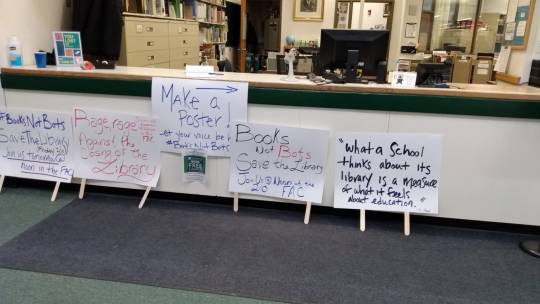
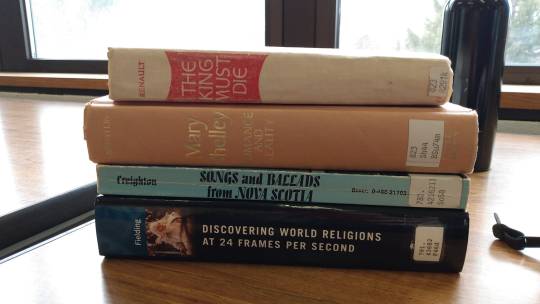
I hear people on Tumblr talk a lot about the importance of libraries; now’s your chance to help save one!
At Vermont State University is a newly merging Uni in so-called North America, pushing together three previously separate universities: Castleton University, Northern Vermont University, and Vermont Technical College.
Just last week, the new VTSU administration sent out an email to faculty, staff and students announcing that all the libraries at each of the 5 campuses contained within these universities would be moving to an ‘all-digital’ model. Librarians will lose their jobs if this plan goes ahead; in fact, librarians were only informed of this change 11 minutes before the email was sent out.
We have come to understand that this means that all physical material will be removed from the library. They seem to want to do other things with the space, such as set up ‘a coffee or smoothie bar’ and determine ‘what students want’ to do with the space. This plan would go into effect on July 1st, 2023.
The fact is, students want to keep the library as it is. Quiet, and full of stacks and stacks of physical books. The administration cannot claim they are listening to students when we have demonstrated, via hundreds of emails and impassioned testimonies in front of the administration at a forum last week, that we hate this plan and oppose it vehemently. And the faculty and staff are with us, and they too have been speaking out. Not only that, the communities that surround these colleges greatly value having access to a research library, particularly in rural Vermont, and are opposing the plan as well, because, as far as I know, they will completely lose access to these resources if everything goes digital.
The image of the books above are what I just checked out today. I can’t tell you how much I enjoyed browsing the stacks, in one case (not pictured above) finding a tiny book of Milton’s poetry inscribed with a reader’s name and the year 1865. So many important and precious books like that one are to be found in our library. Each book I checked out hasn’t been checked out for at least 10 years, and that’s one of the administration’s excuses for taking all our books away: that circulation is down, and that, somehow, it costs money to let books sit on a shelf. As many people have rebutted, though, just because books aren’t being checked out doesn’t mean they aren’t being read within the library and, most importantly, it doesn’t mean that they don’t have value.
Below I will post some links to various local news article on this subject as well as one radio broadcast that will probably be able to articulate this situation better than I can.
I’m just so angry and upset about this. I’ve seen students and faculty alike crying about this situation, and an old lady braver than me telling the administration that maybe they should consider lowering their own salaries before taking away our books. I think everyone here feels powerless, because the administration isn’t backing down, despite all our protests, because ultimately their goal is profit and to make sure that this new ‘equitable’ University makes as much money as possible.
At the Castleton forum, the president of the University said he was ‘deeply humiliated’, by the outrage, by the heckling, the ‘throwing of verbal tomatoes’ as I have taken to calling it, by having his and his fellow’s bullshit exposed and questioned.
Please, please, if you care about books, about libraries, about the problems with big tech and the way it continues to invade all our lives, replacing physical experiences with their more hollow, less engaging counterparts; if you care about the interests of the people triumphing over the interests of capital, about students, about education, then please -- help save our books by spreading the word however and wherever you can, by flooding the inboxes of the capitalists below; tell them how you feel about this decision and its larger implications for books and libraries in general! Not so much to convince them that they’re wrong (they already know that and don’t care), but to make going forward with this plan more of a nuisance and a PR nightmare than cancelling it would be.
I don’t know if anyone will read or see this post, but please if you do and you care, reblog, educate yourself on what’s going on, and take action if you can.
A few disclaimers:
Any specifics I mention pertain primarily to what I, as a student at Castleton University, have either heard via word of mouth or seen with my own eyes. I am not officially speaking on behalf of anyone but myself.
The only exception to all the physical materials being removed from the libraries seem to be the books deemed ‘most used’ and some valuable historical collections. This was not clear from the beginning and not yet fully clear in any further specificity.
please try not to use violent rhetoric - as much as I’m not into policing people’s speech and anger, I don’t want this to backfire and I don’t want them to crackdown harder on us or make a big stink about it if they receive those kinds of messages
Email addresses of administration officials responsible for this decision:
VTSU President Grewal: [email protected]
VTSU Provost Atkins: [email protected]
VSC Chancellor Zdatny [email protected]
VSC Board of Trustees Chair: Eileen “Lynn” Dickinson [email protected]
News articles + broadcast:
https://www.vermontpublic.org/show/vermont-edition/2023-02-10/vermont-state-university-president-on-move-to-all-digital-libraries-changes-in-athletic-programs
https://www.rutlandherald.com/news/local/castleton-community-protests-vtsu-library-cuts/article_100d9539-c6ca-569e-a9b9-ecd6b3cef0ad.html
https://vtdigger.org/2023/02/08/vermont-state-university-to-close-libraries-downgrade-sports-programs/
http://www.castletonspartan.com/2023/02/12/vtsu-library-plan-sparks-outrage-and-emotion/
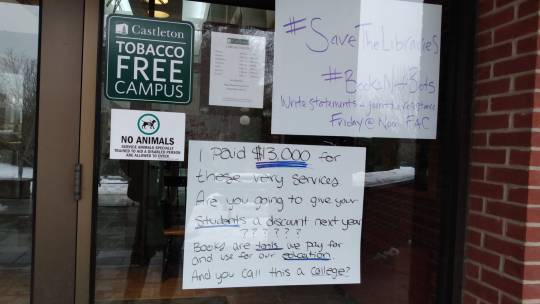
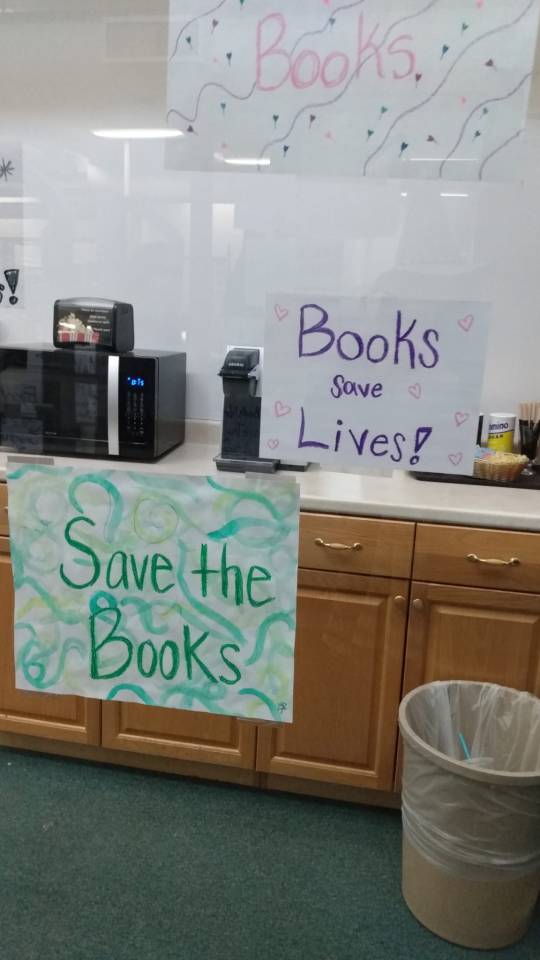

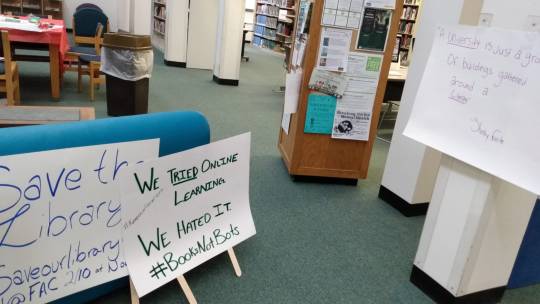
#signal boost#save libraries#books#total liberation#my post#anarchism#public services#capitalism#fight back#boost#please help#mutual aid#libraries#libraries are the best#support local libraries#academic libraries#school libraries#librarians#workers rights
1K notes
·
View notes
Text

Library aesthetic



#dream#dreams#liminal#dreamscapes#dreamscape#liminal aesthetic#liminal spaces#library#old architecture#architecture#libraries#public libraries#books & libraries#school libraries#academic libraries#academia aesthetic#dark academia
359 notes
·
View notes
Text
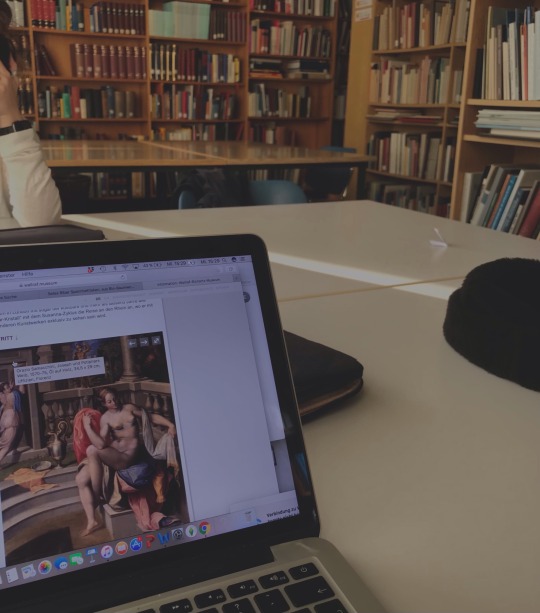

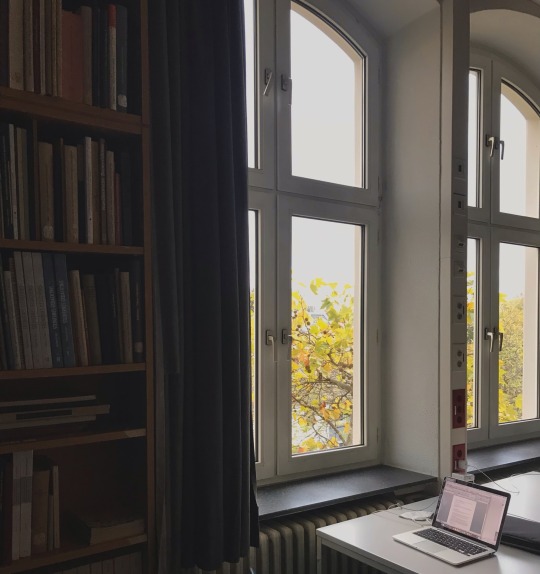

i would live in this library if i could
#study motivation#light acamedia#studyblr#studying#dark academia#studyspo#university#academic libraries#books & libraries#booklr#books#bookshelf#dark aesthetic#aestehtic#light academism#dark academism#art history
730 notes
·
View notes
Text
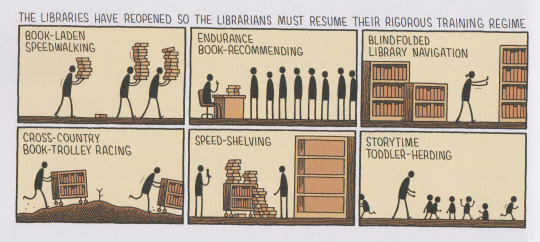
Comic by Tom Gauld
#librarylife#libraryland#school libraries#school librarian#libraries#tom gauld#funny picture#librarianship#librarians#public libraries#academic libraries#lol
70 notes
·
View notes
Text
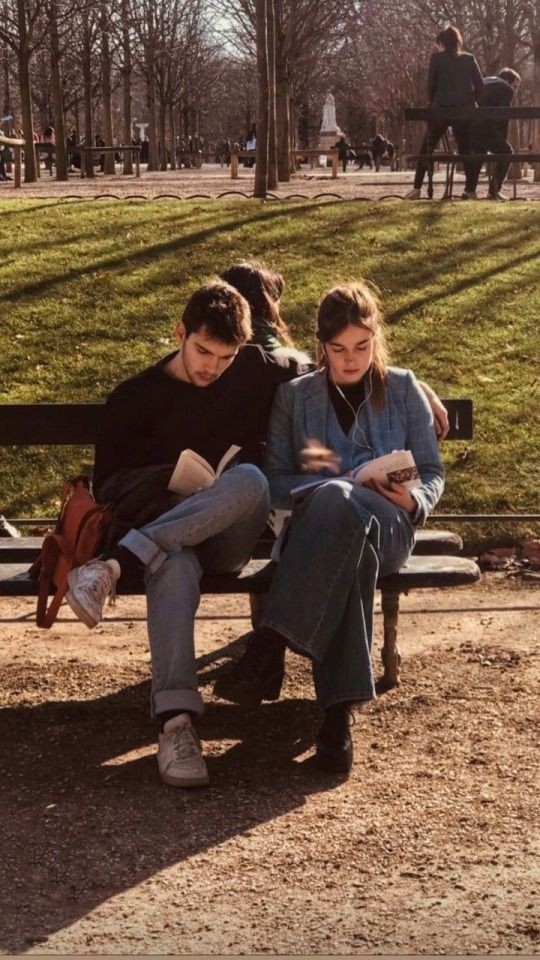
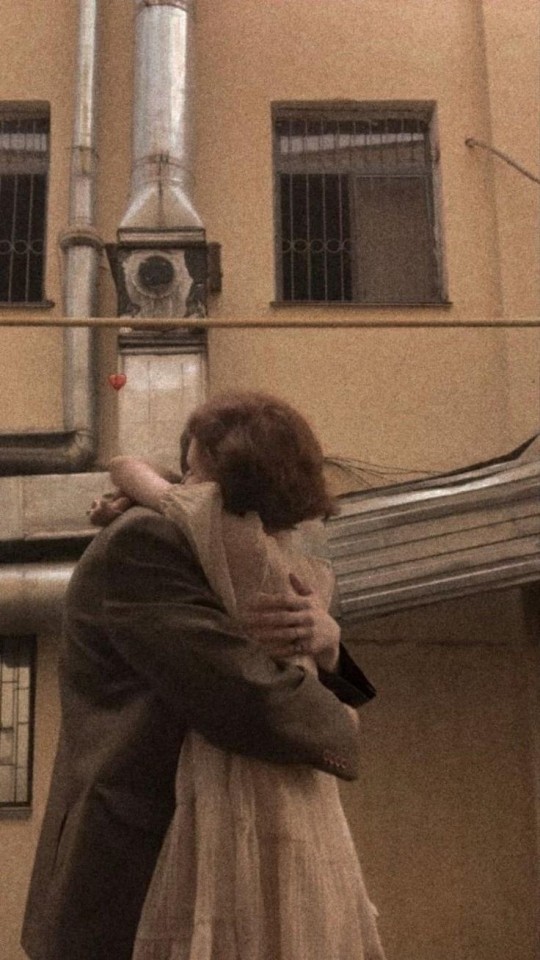

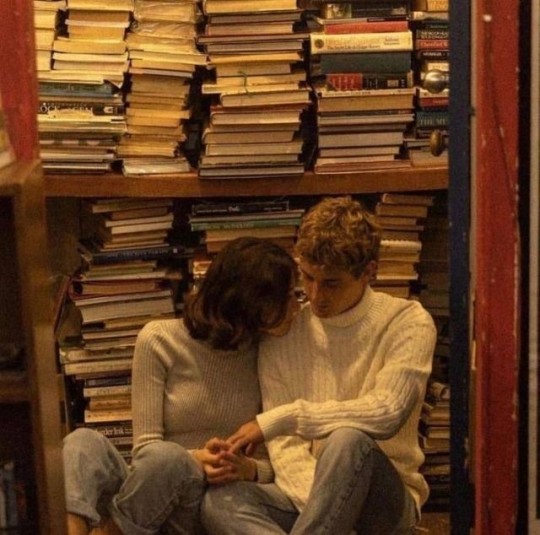
In the era of calamities, you're a moment of peace.
— The Unsaid Story
Source: Pinterest
#dark academia#romantic academia#dark aesthetic#old aesthetic#romantic#romance#hopelessly in love#lovers#love#dark souls#romantizing life#romantic aesthetic#soft academia#dark acadamia aesthetic#dark academia moodboard#soft aesthetic#classic aesthetic#classic academia#books & libraries#academic libraries#books#poetry#literature#chaotic academia#soulmates
36 notes
·
View notes
Text
“In principle and reality, libraries are life-enhancing palaces of wonder.”
― Gail Honeyman, Eleanor Oliphant Is Completely Fine.
#booklr#books#bookblr#fiction#book#quotes#book quotes#quotations#quote#book quote#libraries#books & libraries#public libraries#school libraries#support libraries#academic libraries#gail honeyman#eleanor oliphant is completely fine
63 notes
·
View notes
Text

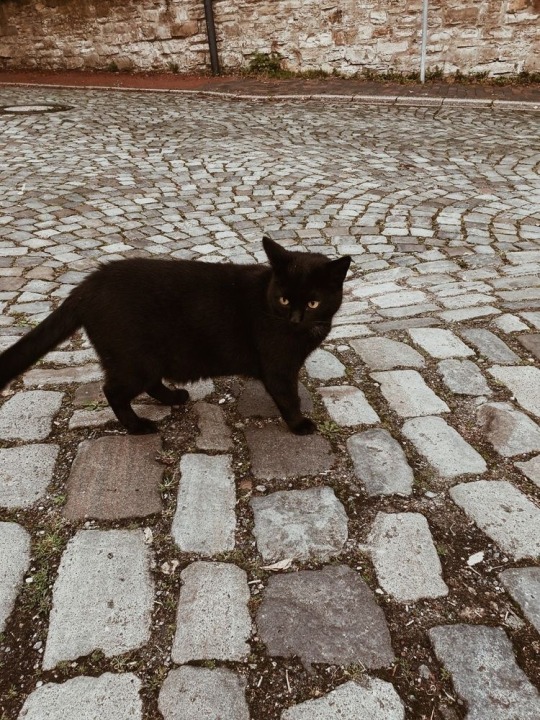
when black cats prowl and pumpkins gleam, may luck be yours on Halloween 🍁
– Unknown
#wednesdays full of woe#autumn#autumn gif#autumn academia#autumn moodboard#pumpkin#horror#halloween#halloween vibes#halloween aesthetic#horror halloween#black cats#dark academia#books#literature#light academia#poems#academic libraries#libraries#dark acadamia aesthetic#dark academia moodboard#spilled ink#studyspo#book aesthetic#chaotic academia#book romance#art study#poems on tumblr#dark aesthetic#poetry
844 notes
·
View notes
Text
Silence?
In the library?
It’s more likely than you think!
#dougie rambles#personal stuff#library#libraries#public libraries#academic libraries#libraries and archives#the library#doctor who#silence in the library#forest of the dead#what#no context#it’s more likely than you think#silence
86 notes
·
View notes
Text
I don't feel particularly proud of myself. But when I walk alone in the woods or lie in the meadows, all is well.
— Franz Kafka, Letters to Friends, Family, and Editors
#books & libraries#dark acadamia aesthetic#dark academia#spilled ink#academic libraries#long reads#booklover#poetsandwriters#female poets#poetry#kafkaesque#kafka#franz kafka#kafka diaries
255 notes
·
View notes
Text
(This is for a paper I'm writing, so it would help me a lot to vote, reblog, and elaborate in the tags. )
#media#polls#literature#literature problems#books#novel#novels#books & libraries#library#public libraries#support libraries#libby#academic libraries#college#bookblr#digital library#tumblr polls#my polls#reasearch
20 notes
·
View notes
Text
📚How to Read an Academic Paper📚
"The more that you read, the more things you will know. The more that you learn, the more places you’ll go." —Dr. Seuss *̥˚✧
Reading an academic paper can be as much of a challenge as finding the source in the first place, if not more so. Knowing how to approach the process can help take you from struggling through it, to learning what you need to know in the least terrible way possible.
Structure of a Paper
Academic papers tend to follow a similar format. APA is as follows:
Title
The name of the paper, authors, dates, etc.
Abstract
A short summary of the paper.
Introduction
Introducing the paper. Sometimes this is written before the experiment starts. You often find the hypothesis here for an experiment. Sometimes it’s written after, but they’ll usually write it as if it was written before.
Methods and Materials
How they did it and what they used.
Results of the Study
What they found and how they analyzed it.
Discussion
What they concluded from the results and why, often with sources from other similar papers.
Conclusion
What this means and what they concluded.
(No Introduction, Methods, Results and Discussion [IMRaD] you are most certainly not RAD. >:( )
How to Read Papers by Type
Different papers from different fields can present unique challenges to reading and understanding.
Start with the abstract. Once you’re done reading the abstract mosey on down to the conclusion! Ignore the middle bits! Most of the time the middle bits are there to tell other researchers “I gotta make sure this is up to the standard of academic research!” Once you’ve read it once you can go back to the Method and judge how they performed it. However, at first this is a lot so go read the conclusion! It should be short, sweet, and tell you what they have spent the last so-and-so pages arguing. This will make it easier to understand.
It may seem counterintuitive to go in this order because we are taught to read books top-to-bottom left-to-right, but academia is full of clowns who speak in code.
Humanities Papers
Humanities papers are the most likely to dunk the format of a research paper. They are also usually based on the researcher’s interpretation of a primary source.
Because humanities papers are often based on the researchers' (albeit very educated) opinion it lends itself to a critical analysis of everything from translation to cultural or social bias from the researcher much more easily. (What primary sources did they base their conclusions on? Would you have done the same? What have other researchers said? In the cultural context of the time, does this translation make sense?) However, this tends to come after you’ve successfully understood what the researcher is trying to say.
Primary Source
A primary source is first-hand knowledge of something. These can include a writing from a time period by someone who was there, a record made at the time, a photograph, or even an artifact.
Secondary Source
A secondary source is second-hand knowledge. These are the papers written on the subject, textbooks, and accounts written by the people who were not around when it happened. They are not inherently worse than secondary sources, and are very important for spreading knowledge, but research based on secondary sources tends to be a compilation of a lot of research rather than direct investigations. [See: Historiographies. Synthesized studies. Meta Analysis.]
Scientific Papers
The abstract is your best best friend!!! They are not hiding the ball, it’s in the abstract. Then once again take yourself on a trip to the conclusion. Scientific papers almost never deviate from this format. Read it once, twice, and thrice again until you understand what the abstract is saying. This will help you understand the whole paper better.
Additional Complications for Scientific Papers
Experimental design can be, and has been, the subject of many an entire college semester for many people. Don’t expect to understand it outright if you’re new! For the results of most studies, the relevant concept is going to be "statistical significance". This is the probability that the results were found by chance. It is generally decided ahead of time based on what is being measured and notated similarly to p<.05. This means that the statistical probability of getting those results by pure coincidence is small enough to be significant.
Often in the discussion section you’ll see the author talk about their sample size, their potential biases, and the limitations of their experimental design (if they don’t the other academics will laugh at them). While you can look at this yourself and decide, this often gives a good idea of where there could be room for error.
Qualitative vs Quantitative
Qualitative data is the how, what, and why of research. Quantitative is the numerical measurements. [Think “quality vs quantity”.] There are different statistical terms and analyses for these different types of measurements, but that could be a whole course, let alone document, in and of itself. They use big words like they’re being sponsored by WebMD and Webster both.
Think of it like this: if you do an experiment and adding something to someone’s drink causes it to taste sweeter, that’s a qualitative measurement. If you’re adding something to someone’s drink and it raises their blood pressure from 100 to 120, that’s a quantitative measurement. Differentiating between them can be tricky, but a good tip to keep in mind is if it’s studies with people is that qualitative research is usually done with small groups of people - often 100 people or less, while quantitative research will often be upwards of the hundreds. This is because with quantitative research you often need large sample sizes for the data to be meaningful.
There are many types of qualitative research, including interviews, ethnographies, oral history, case studies, focus groups, record keeping, different kinds of observations, etc, while on the quantitative research side of things, we have our surveys, descriptive research, experimental research, correlational research, comparative-causal research, and more.
Causing you Problems
Those are the general rules and advice, now let's talk about how they are broken.
Style
The structure of an academic paper differs by style. APA sticks to this format very strictly. However, Chicago (my mortal enemy) is going to have footnotes to contend with, but could still have an abstract and a conclusion. If it has neither of those, lament them, shame them, and curse the author to the pit before skirt skirting your way to the first paragraph (approximately the abstract or introduction), and the last two or three paragraphs (approximately the conclusion). They tend to have generally the same information as would be found in a labeled heading.
The code clowns not only said “make it complicated”, they made it complicated across several different paper writing formats. If by some unholy tragedy you find a writing in MLA? Bite the author with your real teeth, and hope your highschool prepared you for this. At the very least MLA tends to be easier to read by starting at the beginning.
Jargon
Academic papers are often incredibly dense! Academia knows this! Please don’t be afraid to look up words you don’t necessarily understand! It’s not shameful! Shame them for using big words, like the pompous elites they are, and pull out a dictionary. Understanding is important! If all else fails, no one needs to know you looked up a word, you can just do a quick Google search and look like a pro. I do it all the time.
Plus there are often tons of educational materials for learning academic jargon because no one is born educated. They had to learn it, they are just expecting their audience to be someone who has already gotten a degree on the subject. It’s dense and boring, “no one else is reading this shit, surely,” they think while dunking a donut in a cup of hot Red Bull.
#This is the second part of a two part series on academic accessibility!#witchcraft#school of roses#magic#witchy#witchblr#witch tips#witches#baby witch#basics#academic research#academic libraries#academic essay#academiclife#academichelp#chaotic academia#classic academia#university#student#school#college#information accessibility#education#jargon#long post#important#academic papers#apa format#hope this helps!#Come say hi in the Discord!
320 notes
·
View notes